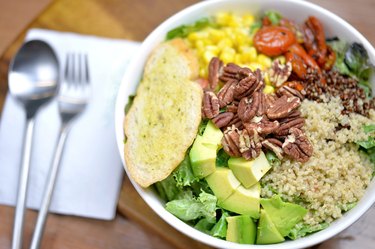
Your thyroid is a small gland located just below your Adam's apple. It produces hormones that help regulate your metabolism. Hypothyroidism is a condition in which your body does not produce enough of the necessary hormones, causing your metabolism to slow down. There is no specific vegetarian diet for hypothyroidism. However, a vegetarian diet is a healthy diet that can aid in weight control and help you meet your nutrient needs.
Hypothyroidism
Video of the Day
Hypothyroidism is a common condition that affects people of all ages and races. However, it is more commonly seen in women, and affects nearly 20 percent of women over age 50, according to the Cleveland Clinic. Hypothyroidism is most commonly caused by an autoimmune disorder called Hashimoto's disease. Inflammation of the thyroid caused by a viral infection or pregnancy can also lead to hypothyroidism, along with radioactive therapy to treat hyperthyroidism. Without enough of the thyroid hormone, you may experience fatigue, constipation, weight gain, intolerance to cold and forgetfulness. Treatment for hypothyroidism requires you take thyroid hormone replacement medication.
Video of the Day
Vegetarian Diet
The vegetarian diet omits meat and meat products, with or without eggs and dairy products. The vegetarian diet is a healthful diet that, when well planned, can help you meet your nutrient needs. In addition, people who follow a vegetarian diet tend to be thinner, and have lower rates of heart disease, cancer and diabetes, according to the American Dietetic Association. The only thing you need to be concerned with when following the vegetarian diet is the possible interaction with certain foods and your medication. This includes walnuts and foods made with soybean flour, which can impair the absorption of your medication. You can eat these foods, but only several hours before or after you take your medication.
Grains
Grains are an important source of carbohydrates, fiber, B vitamins, iron and magnesium on your vegetarian diet plan. Your daily grain needs vary depending on your calorie needs, but range from five to 12 servings a day. Most of your grain choices should be whole grains. Healthy choices include whole-wheat bread, whole-grain cereals, whole-grain crackers, quinoa, barley, millet and brown rice.
Legumes and Soy
Beans, lentils and soy foods are important sources of protein on your vegetarian diet. When including soy products on your diet, eat them several hours after you take your thyroid medication. Include one to three servings of legumes or soy a day. Healthy choices include kidney beans, garbanzo beans, split peas, tofu, tempeh and soy milk.
Fruits and Vegetables
Fruits and vegetables are also high in fiber, and provide your body with vitamin C, vitamin A, potassium and folate. They are also low in calories, which is important if weight gain is an issue for you. Aim for thee to five servings of fruits a day, and six to nine servings of vegetables. Healthy choices include apples, oranges, blueberries, melon, spinach, leafy greens, broccoli, carrots, green beans and kale. Alaria and dulce are two types of seaweed, also known as sea vegetables, which can help you meet your vitamin B-12 needs. Vitamin B-12 is generally only in animal products.
Nuts and Seeds
Nuts and seeds provide protein, fiber and essential fatty acids. These foods are high in calories, so you need to watch your intake and eat only one to two servings a day. Good choices for your vegetarian diet plan include peanuts, cashews, almonds, flax seed, sunflower seeds and any nut butter.
Oils
Use oils for cooking or to add flavor for food. As a fat, they are calorie-dense, so limit your intake to one to two servings a day to help aid in weight control. Healthy vegetable oils include olive oil, canola oil, soy oil and safflower oil.
Milk and Eggs
Not all vegetarians include milk or eggs in their diet. Both are good sources of protein and vitamin B-12. Milk is also a good source of calcium. If you have high blood cholesterol, you should only eat eggs a few times a week. You can have up to two servings of milk a day on your diet plan.